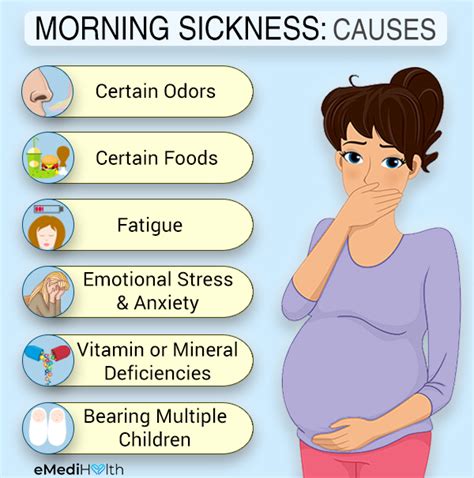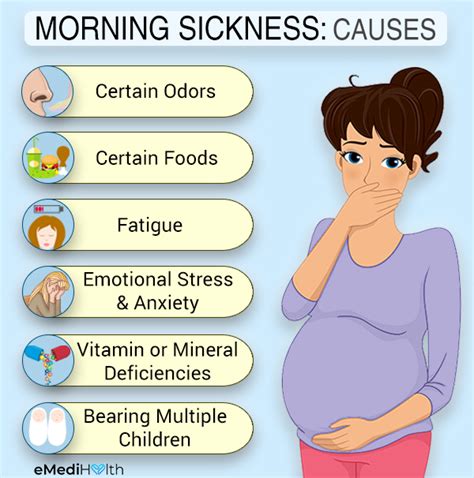Intro
Discover morning sickness symptoms, causes, and relief methods. Learn about nausea, vomiting, and fatigue, and how to manage them during pregnancy with natural remedies and lifestyle changes.
Morning sickness is a common phenomenon experienced by many women during the early stages of pregnancy. It is characterized by a feeling of nausea and vomiting, which can be triggered by a variety of factors, including hormonal changes, sensitivity to smells, and dietary habits. Despite its name, morning sickness can occur at any time of the day, and its severity can vary from woman to woman. Understanding the symptoms and causes of morning sickness is essential for managing its effects and ensuring a healthy pregnancy.
For many women, morning sickness is one of the first signs of pregnancy, and it can be a challenging experience to navigate. The symptoms can be unpredictable and may interfere with daily activities, making it essential to find ways to manage and alleviate them. Fortunately, there are several strategies that can help, including dietary changes, lifestyle modifications, and natural remedies. By understanding the causes and symptoms of morning sickness, women can take proactive steps to minimize its impact and enjoy a healthier pregnancy.
The experience of morning sickness can be overwhelming, especially for first-time mothers. The constant feeling of nausea and vomiting can be exhausting, and it may seem like there is no end in sight. However, it is essential to remember that morning sickness is a temporary condition that will subside as the pregnancy progresses. With the right support and guidance, women can learn to manage their symptoms and focus on the positive aspects of their pregnancy. Whether it's through dietary changes, relaxation techniques, or medical interventions, there are many ways to alleviate the discomfort of morning sickness and enjoy a healthy and happy pregnancy.
Morning Sickness Causes and Triggers

Role of Hormonal Changes
Hormonal changes are a significant contributor to morning sickness. The increase in hCG, estrogen, and progesterone can affect the digestive system, leading to nausea and vomiting. These hormonal changes can also affect the sense of smell, making women more sensitive to certain odors. Additionally, the hormonal fluctuations can affect the digestive system's motility, leading to slower digestion and increased nausea.Sensitivity to Smells
Sensitivity to smells is another common trigger for morning sickness. Certain odors, such as cooking smells, perfume, or cigarette smoke, can trigger nausea and vomiting. This sensitivity can be overwhelming, making it essential to identify and avoid triggers. Some women may find that certain smells are more tolerable than others, and avoiding these triggers can help alleviate symptoms.Morning Sickness Symptoms and Severity

Mild Morning Sickness
Mild morning sickness is characterized by occasional nausea and vomiting. Women with mild symptoms may be able to manage their symptoms with dietary changes and lifestyle modifications. Mild symptoms can be uncomfortable, but they are typically not debilitating.Severe Morning Sickness
Severe morning sickness, also known as hyperemesis gravidarum, is a more serious condition that requires medical attention. Women with severe symptoms may experience persistent and severe nausea and vomiting, leading to dehydration and weight loss. Severe symptoms can be debilitating and may require hospitalization to manage dehydration and electrolyte imbalances.Managing Morning Sickness

- Eating small, frequent meals to manage nausea and prevent vomiting
- Avoiding trigger foods and smells
- Staying hydrated with water and electrolyte-rich beverages
- Practicing relaxation techniques, such as deep breathing and meditation
- Getting plenty of rest and avoiding strenuous activities
Dietary Changes
Dietary changes can play a significant role in managing morning sickness. Eating small, frequent meals can help manage nausea and prevent vomiting. Avoiding trigger foods, such as spicy or fatty foods, can also help alleviate symptoms. Some women may find that eating bland foods, such as crackers or toast, can help settle their stomach.Lifestyle Modifications
Lifestyle modifications, such as getting plenty of rest and avoiding strenuous activities, can also help manage morning sickness. Practicing relaxation techniques, such as deep breathing and meditation, can help reduce stress and alleviate symptoms. Additionally, staying hydrated with water and electrolyte-rich beverages can help prevent dehydration and electrolyte imbalances.Natural Remedies for Morning Sickness

- Ginger: Ginger has natural anti-inflammatory properties that can help alleviate nausea and vomiting.
- Peppermint: Peppermint oil or tea can help calm the stomach and reduce nausea.
- Vitamin B6: Vitamin B6 supplements can help alleviate morning sickness symptoms.
- Acupuncture: Acupuncture can help stimulate the body's natural healing processes and alleviate morning sickness symptoms.
Ginger and Morning Sickness
Ginger has been shown to be an effective natural remedy for morning sickness. Ginger has natural anti-inflammatory properties that can help alleviate nausea and vomiting. Some women may find that drinking ginger tea or taking ginger supplements can help alleviate symptoms.Peppermint and Morning Sickness
Peppermint oil or tea can also help calm the stomach and reduce nausea. Peppermint has a calming effect on the digestive system, which can help alleviate morning sickness symptoms. Some women may find that drinking peppermint tea or inhaling peppermint oil can help alleviate symptoms.What are the most common symptoms of morning sickness?
+The most common symptoms of morning sickness include nausea, vomiting, and sensitivity to smells. Some women may also experience headaches, fatigue, and mood changes.
How long does morning sickness typically last?
+Morning sickness typically lasts throughout the first trimester of pregnancy, but it can persist into the second trimester in some cases. The severity and duration of symptoms can vary from woman to woman.
What are some natural remedies for morning sickness?
+Some natural remedies for morning sickness include ginger, peppermint, and vitamin B6 supplements. Acupuncture and relaxation techniques, such as deep breathing and meditation, can also help alleviate symptoms.
When should I seek medical attention for morning sickness?
+You should seek medical attention if you experience severe nausea and vomiting, dehydration, or electrolyte imbalances. If you are unable to keep fluids down or experience persistent vomiting, you should seek medical attention immediately.
Can morning sickness be prevented?
+While morning sickness cannot be completely prevented, there are steps you can take to reduce your risk of developing severe symptoms. Eating a balanced diet, staying hydrated, and avoiding trigger foods and smells can help minimize symptoms.
In conclusion, morning sickness is a common phenomenon experienced by many women during the early stages of pregnancy. Understanding the causes, symptoms, and severity of morning sickness is essential for managing its effects and ensuring a healthy pregnancy. By incorporating dietary changes, lifestyle modifications, and natural remedies, women can alleviate their symptoms and enjoy a healthier pregnancy. If you have any questions or concerns about morning sickness, we encourage you to comment below or share this article with your friends and family. Remember, you are not alone in your experience, and there are many resources available to support you throughout your pregnancy journey.
